おすすめの Google 拡張機能です!新しい言葉を勉強しましょう!
Here are the recommended Chrome extensions! Let’s learn new words here!
ポッドキャストプラットフォーム|Platforms of Podcast
こちらの記事は、配信中のポッドキャストのスクリプトです。
ぜひ、ポッドキャストを聞きながら読んでください。
 えみ先生
えみ先生もう聞いた人は、クイズをチェックしましょう!
ことばワークシート|Vocabulary Worksheet from This Episode
えみ先生がエピソードでつかった、ちょっとむずかしいことばを、ワークシートにまとめました。
ワークシートは、エピソードごとに、ひとつひとつ作っています。
それぞれ1ドルです。 (今は無料で プレゼントしています!🎁)
その1ドルが、えみ先生のポッドキャストのサポートになります。🫶
【えいご】English Translation
I made a worksheet with some of the slightly difficult words from each episode.
Each worksheet is created just for that episode.
Each one is only $1. (Giving it away for free now!)
And that $1 is a kind way to support my podcast. 🫶
ちょっとクイズ!|CHOTTO Quiz!
ポッドキャストを聞いた人は、ちょっとクイズを解いてみましょう。
むずかしいときは、下のスクリプトを読んで、もう一度クイズをチェックしてみてください。
【えいご】English Translation
Answer these quiz questions if you’ve listened to a new episode of my podcast.
If it was difficult, read the transcript below and try again.
❓ 小学校の遠足で、えみ先生が 一番楽しみにしていたことは何ですか?|In elementary school Ensoku (excursions), what did Emi-sensei look forward to the most?
えみ先生は、お弁当の時間を楽しみにしていました。特に、友だちと おやつを交換するのが楽しかったです。
Emi-sensei would look forward to lunchtime with bento. Especially, she loved exchanging snacks with her friends.
❓ 高校の文化祭で、えみ先生のクラスは何をしましたか?|At the high school culture festival, what did Emi-sensei’s class do?
えみ先生のクラスは、焼きそばを売りました。
Emi-sensei’s class sold Yakisoba.
❓ 大学で、えみ先生が入ったサークルの名前は何ですか?|At university, what was the name of the university club Emi-sensei joined?
えみ先生は、TFTというボランティアグループに入っていました。
Emi-sensei joined a volunteer group called TFT (Table For Two).
ポッドキャストのスクリプト|Transcript of Podcast
エピソード33「遠足?文化祭?学校のイベント」
このポッドキャストは、初中級(Pre-Intermediate)レベルです。
おはようございます。こんにちは。こんばんは。
日本語の先生、エミです。
最近、仕事の間に アニメを見ています。
ワンピースを見ています。
ワンピース、みなさん見たことありますか?
あ、みなさんアニメ派ですか?マンガ派ですか?
どっちが好きですか?
ワンピースは マンガもあるし、アニメもありますね。
私はアニメ派です。アニメのほうが好きです。
でも、ワンピースはエピソードがたくさんありますよね。
新しいエピソードまで見た人はいますか?
私は今、シーズン8のエピソードを見ています。
ホールケーキアイランド編ですね。ビックマムのところです。
【えいご】English Translation
Good morning. Hello. Good afternoon.
I am a Japanese teacher, Emi.
Lately, I’ve been watching anime during work breaks.
I’m watching One Piece.
Have you ever watched One Piece?
Ah, are you more of an anime person? Or a manga person?
Which do you like better?
One Piece has both a manga and an anime.
I’m an anime person. I like anime better.
But One Piece has so many episodes, right?
Has anyone watched up to the newest episodes?
Right now, I’m watching Season 8.
It’s the Whole Cake Island arc, with Big Mom.
私が学生の時、学校の後に よくテレビでワンピースを見ていました。
でも、大人になってから 忙しくて全然見れていなかったんですけど、最近からまた見始めました。
もしワンピースを見ている人がいたら、好きなエピソードを教えてください。
はい。じゃあ…
【えいご】English Translation
When I was a student, I often watched One Piece on TV after school.
But after becoming an adult, I was too busy to watch it at all. Recently, I started watching again.
If anyone else is watching One Piece, please tell me your favorite episode.
ここで先週の質問をチェックしましょう。
先週は こんな質問をしました。
「学校の思い出で、一番楽しかったことはなんですか?」
こんな質問でした。
【えいご】English Translation
Alright, now let’s check last week’s question.
Last week, I asked this question:
“What was the most fun memory from your school days?”
That was the question.
今日のテーマは、「学校の思い出」です。
みなさん、どんな学校の思い出がありますか?
まずは、日本の学校のシステムについて、すこし紹介します。
日本には、小学校、中学校、高校、大学の4つがあります。
この4つは、勉強をする場所ですね。学校です。
小学校は、6年間で、6歳から12歳までです。
中学校は、3年間で、12歳から15歳までです。
高校も3年間で、15歳から18歳までです。
そして、大学は、4年間です。
【えいご】English Translation
Today’s theme is school memories.
What kind of school memories do you have?
First, let me introduce Japan’s school system.
In Japan, there are four levels: elementary school, junior high school, high school, and university.
These four are places for study. Schools.
Elementary school is for six years, from ages 6 to 12.
Junior high school is three years, from ages 12 to 15.
High school is also three years, from 15 to 18.
And university is four years.
それぞれの学校の学生を、小学生、中学生、高校生、大学生と言います。
今日は、私が小学生だった時から、大学生の時までの思い出をお話しします。
でも、小学生の時のことは、もう20年ぐらい前です。
ずいぶん前ですね。ずいぶん昔です。
【えいご】English Translation
We call the students at each level:
elementary school student (shougakusei), junior high school student (chuugakusei), high school student (koukousei), and university student (daigakusei).
Today, I’ll share my memories from when I was an elementary school student through to when I was a university student.
But my elementary school days were about 20 years ago.
That was a long time ago.
小学生のときは、毎年「遠足」というイベントがありました。
遠足、聞いたことありますか?
遠足は、クラスのみんなで外に出かける学校のイベントです。
たとえば、大きな公園に行ったり、少し大きくなって11歳とか12歳とかになると、工場に行ったり、博物館の見学にも行ったりします。
【えいご】English Translation
In elementary school, every year we had an event called an ensoku (school excursion).
Have you heard of ensoku?
Ensoku is a school event where the whole class goes on a trip outside.
For example, we might go to a big park, and when we got a little older, like 11 or 12, we also visited factories or museums.
私が遠足で一番楽しみだったのは、お弁当の時間です。
みんな自分のお弁当を持って行きます。
そして、おやつも持って行きました。
おやつ、知っていますか?
おやつは、お菓子、同じですね。
チョコレートとかポテトチップス…、これがおやつです。
でも、おやつにはルールがあります。
【えいご】English Translation
The thing I looked forward to most during ensoku was lunchtime with bento.
Everyone brought their own bento.
And we also brought oyatsu.
Do you know oyatsu?
Oyatsu means snacks.
Like chocolate or potato chips—those are oyatsu.
But there was a rule about snacks.
それは「値段」です。値段。
値段はお金のことです。
おやつのお金にルールがありました。
だいたい300円まででした。
300円のお菓子を1つ買ってもいいし、100円のお菓子を3つ買っても大丈夫です。
ルールは学校によって違いますが、私の小学校はこんなルールでした。
【えいご】English Translation
That rule was about the Nedan.
Nedan (price) means Okane (money).
We had the rule about the price.
At my school, the rule was usually up to 300 yen.
You could buy one snack that costs 300 yen, or three snacks that cost 100 yen each.
The rule was different depending on the school, but this was my school’s rule.
お昼ごはんのあと、友達とおやつを交換するのがとっても楽しかったです。
自分では1つとか2つとかだけお菓子を持っていくので、みんなと交換して いろいろなお菓子を食べられるのがとっても嬉しかったですね。
みなさんの国では遠足ありますか?
おやつのルールありますか?
はい。
【えいご】English Translation
After lunch, it was so much fun to trade snacks with my friends.
Since I only brought one or two kinds myself, I was really happy that I could try many different snacks by exchanging with everyone.
Does your country have school excursions?
Do you have snack rules?
次は中学生の時のエピソードです。
中学生になると、多くの人が「部活」を始めます。
部活はクラブ活動のことです。
たとえば、サッカー部、バスケ部、吹奏楽部(ブラスバンド)ですね。
そんな部活があります。
【えいご】English Translation
Okay, next is a story from when I was in junior high school.
In junior high, many students start joining Bukatsu.
Bukatsu means club activities.
For example: soccer club, basketball club, brass band club.
Those are some examples.
私は 3か月だけ バレー部に入りました。
でも、プレイヤーじゃなくてマネージャーでした。
マネージャーは、部活のサポートをする人です。
飲み物を用意したり、ボールを渡したり、あとは試合でラインズマン(審判)をしたりしました。
みなさんは学生の時、部活をしていましたか?
どんな部活がありましたか?
めずらしい部活はありましたか?
ぜひ教えてください。
【えいご】English Translation
I joined the volleyball club for only three months.
But I wasn’t a player, I was a manager.
A manager is someone who supports the club.
I prepared drinks, passed balls, and during matches I acted as a linesman (referee).
Did you join a club as a student?
What kind of clubs did you have?
Did you have any unusual clubs?
Please tell me.
そして高校生になると、私は部活じゃなくてアルバイトを始めました。
アルバイトについてはエピソード9でお話しています。
気になる人は聞いてみてください。
高校のイベントは、「文化祭」と「体育祭」というイベントがあります。
【えいご】English Translation
Then, when I became a high school student, instead of joining a club, I started working a part-time job.
I talked about part-time jobs in Episode 9,
so if you’re curious, please check that.
High school events include bunka-sai (school culture festival) and taiiku-sai (sports festival).
「文化祭」は、学校のお祭りみたいなものです。
クラスごとに文化祭で何をするか考えます。
たとえば、劇をしたり、お化け屋敷をしたり、屋台で食べ物を売ったりします。
私のクラスは屋台を選びました。
そして、焼きそばを売りました。
スーパーに材料を買いに行って、レシピを考えてみんなで作りました。
お客さんに焼きそばを売るのがとっても楽しかったです。
【えいご】English Translation
Bunkasai is like a school festival.
Each class decides what to do for the festival.
For example, putting on a play, making a haunted house, or selling food at stalls.
My class chose to sell food.
We made yakisoba.
We went to the supermarket to buy ingredients, made a recipe, and cooked together.
It was really fun selling yakisoba to customers.
そして、あと1つのイベントが「体育祭」です。体育祭。
体育がP.E.の意味です。だから、体育祭はスポーツのお祭りです。
リレーをしたり、綱引きをしたり、ダンスをしたりします。
たくさん体を動かしますね。
でも、私は体育祭より文化祭の方が好きでした。
はい。
【えいご】English Translation
The other event was taiikusai.
Taiiku means P.E., so taiikusai is a sports festival.
We did relays, tug-of-war, dances, and so on.
We moved our bodies a lot.
But I liked bunkasai more than taiikusai.
で、そのあと大学に入ったら「サークル活動」を始めました。
サークル活動、これは部活と 似ていますが、もっと自由です。 Freedomです。
私はTFTというサークルに入りました。
TFTは、テーブルフォーツー(Table for Two)というボランティアグループです。
料理を作ってボランティアをするサークルでした。
ちょっとおもしろいですよね。
気になった人はTable For Two検索してみてください。 調べてみてください。
はい。
【えいご】English Translation
Then, when I entered university, I joined a saakuru (university club).
University clubs are similar to club activities, but feel more freedom.
I joined a club called TFT.
TFT stands for Table For Two, a volunteer group.
It was a club where we cooked and did volunteer work.
Kind of interesting, right?
If you’re curious, please search for Table For Two.
ほかにも大学生の時は、国際交流イベントをしたり、留学生と旅行に行ったりしました。
とってもいい経験になりました。
【えいご】English Translation
Also, during university, I joined international exchange events and went traveling with international students.
They were really great experiences.
こうして考えると、学校には色々なイベントがありましたね。
遠足、部活、文化祭、体育祭、サークル活動。
どれも私にとって大切な思い出です。
みなさんはどうですか?
小学校、中学校、高校、大学、どの時の思い出が 一番心に残っていますか?
ぜひ考えてみてください。
【えいご】English Translation
When I think back like this, I realize there were many events at school.
Ensoku, Bukaatsu, Bunkasai, Taiikusai, Saakuru.
Each one is a precious memory for me.
What about you?
Elementary school, junior high, high school, university—
Which time left the biggest memory in your heart?
Please think about it.
では、今日も みなさんに 質問があります。
「みなさんの友達はどんな人ですか? 親友はいますか?どんな人ですか?」
来週は私の友達について話します。
友達の性格や、いつから友達なのかなどを紹介します。
みなさんの友達についても、ぜひコメントで教えてください。
【えいご】English Translation
Now, I have a question for you today, as always.
“What kind of friends do you have?
Do you have the best friends? What kind of people are they?“
Next week, I’ll talk about my friends.
I’ll introduce their personalities, and when we became friends.
Please also tell me about your friends in the comments.
今日のポッドキャストのスクリプトは、私のウェブサイトにあります。
ウェブサイトは、 en-nihongo.com です。
よかったら、ポッドキャストの感想や、質問の答えをコメントで教えてください!
じゃあ、また来週のポッドキャストで会いましょう。
じゃあね~!
【えいご】English Translation
A transcript for today’s podcast is on my website.
The website is en-nihongo.com .
I’d be very happy if you could share your thoughts/impressions or answer the question I asked in this episode!
I’ll see you in the next episode.
Jaa ne-!
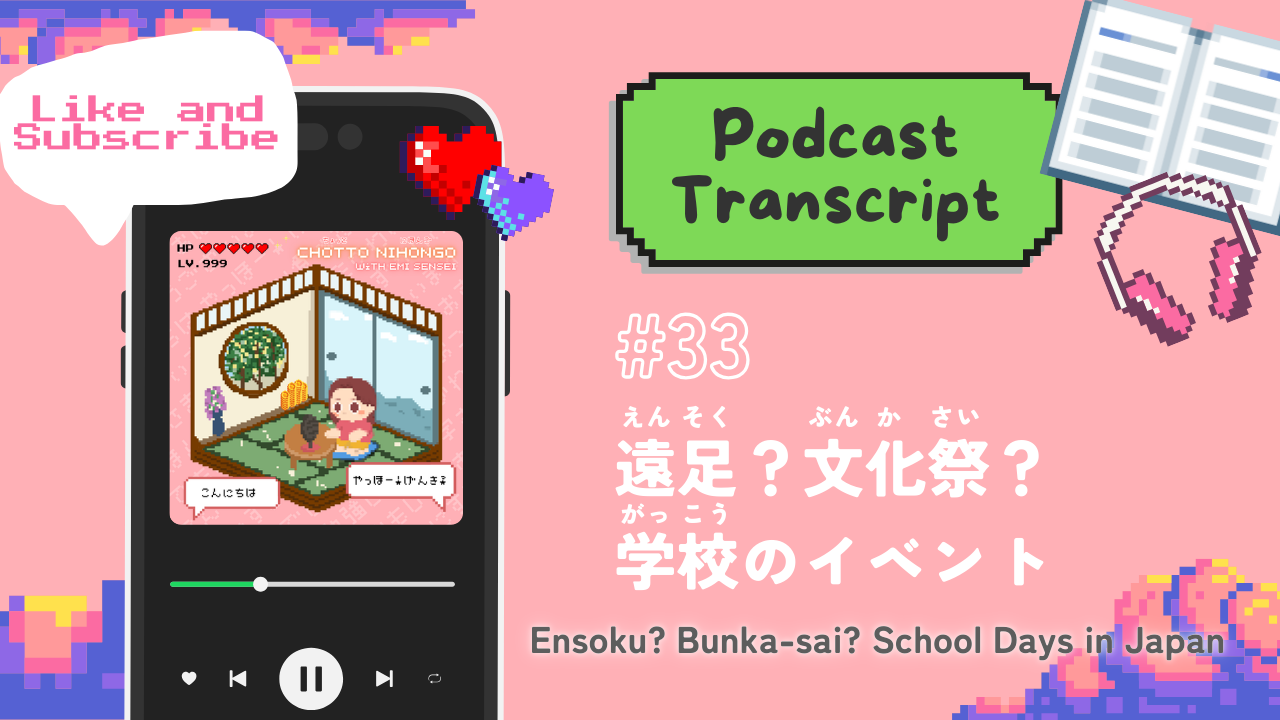

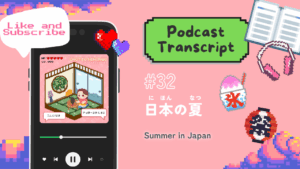
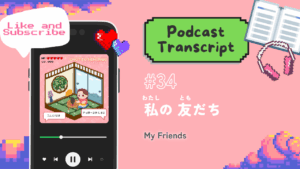


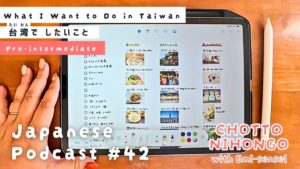
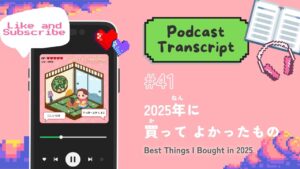
コメント|Comment